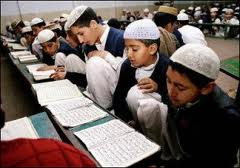by Holly Naylor

Pakistan is teaching its children religious intolerance, which has led to acts of discrimination and sometimes violence against minorities, according to a recent study.
School textbooks contain offensive comments about Christians and Hindus, according to the report.
“Textbooks generally emphasize the fundamental Islamic identity of Pakistan and the need for unity within the Muslim community,” the executive summary of the report said. “The defense of Pakistan is equated with the defense of Islam.”
The report, “Connecting the Dots: Education and Religious Discrimination in Pakistan,” was funded by the U.S. Commission on International Religious Freedom (USCIRF) and conducted by the International Center for Religion and Diplomacy. Teachers and students from 37 public schools and 19 madrassas, or religious schools, were interviewed about their views concerning religious minorities in Pakistan during the year-long study. More than 100 textbooks from grades one through 10 were analyzed as well.
Some of the key findings outlined in a USCIRF news release were:
— “Public school textbooks used by all children often had a strong Islamic orientation, and Pakistan’s religious minorities were referenced derogatorily or omitted altogether.
— “Hindus were depicted in especially negative terms, and references to Christians were often inaccurate and offensive.
— “Public school and madrassa teachers had limited awareness or understanding of religious minorities and their beliefs, and were divided on whether religious minorities were citizens.
— “Teachers often expressed very negative views about Ahmadis, Christians and Jews, and successfully transmitted these biases to their students.
— “Interviewees’ expressions of tolerance often were intermixed with neutral and intolerant comments, leaving some room for improvement.”
Christians and other religious minorities account for less than five percent of Pakistan’s population, according to the most recent International Religious Freedom Report by the U.S. State Department. However, they are guaranteed religious minority rights in education, as the Constitution of 1973 states that receiving religious instruction that opposes one’s own faith is not required. Close examination of textbooks is evidence that the constitution is not being followed, USCIRF says.
Recommendations offered in the Nov. 9 report included:
— “The government should develop stronger standards and provide authentic and functioning mechanisms to ensure compliance with educational regulations and for the reporting and investigation of acts of intolerance toward religious minorities.
— “Foreign aid could be used to build schools with teacher training centers on campuses to promote and implement less exclusionary ideas.
— “Pedagogy reform that promotes critical thinking would undoubtedly prove beneficial in arresting the derogatory portrayal of religious minorities.”
USCIRF Chairman Leonard Leo said the issue deserves immediate attention.
“The findings of the study and the recommendations reinforce USCIRF’s conclusion that education reform incorporating themes of religious tolerance is critical for the development of a tolerant Pakistani society that values religious freedom and religious diversity for all its citizens,” Leo said in the news release. “This is in the interest of both the United States and all Pakistanis.”
Baptist Press sought comment from the Pakistan embassy in Washington but did not receive a response.



